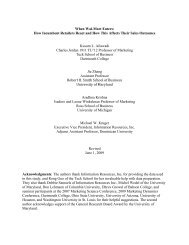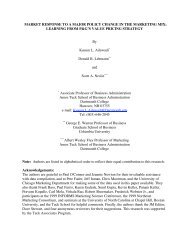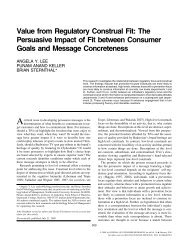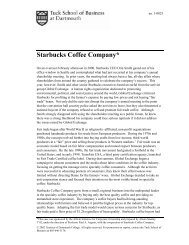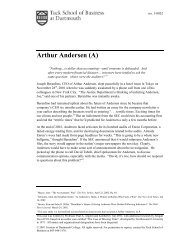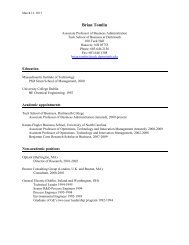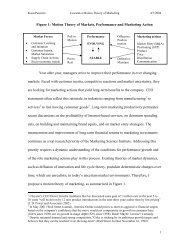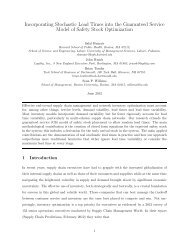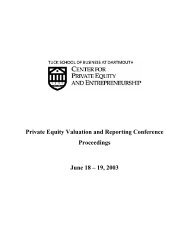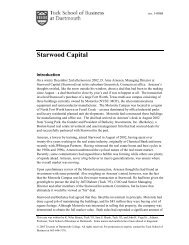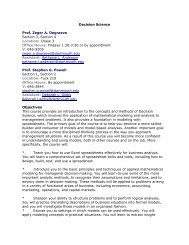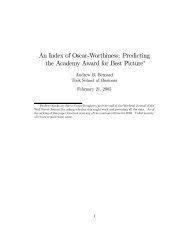tax notes international - Tuck School of Business - Dartmouth College
tax notes international - Tuck School of Business - Dartmouth College
tax notes international - Tuck School of Business - Dartmouth College
Create successful ePaper yourself
Turn your PDF publications into a flip-book with our unique Google optimized e-Paper software.
SPECIAL REPORTS<br />
reports were <strong>of</strong> the same view is that there is little or<br />
no guidance from the <strong>tax</strong> authorities on the issue <strong>of</strong><br />
attribution <strong>of</strong> pr<strong>of</strong>its to PEs. Moreover, most jurisdictions<br />
have little, if any, case law on this issue. 7<br />
The existence <strong>of</strong> different interpretations on the<br />
scope <strong>of</strong> article 7 is therefore against the purpose <strong>of</strong> a<br />
<strong>tax</strong> convention for the avoidance <strong>of</strong> double <strong>tax</strong>ation,<br />
giving rise to harmful consequences on the exchange <strong>of</strong><br />
goods and services between states. The lack <strong>of</strong> consistency<br />
in applying a treaty provision is a major contradiction<br />
to the purpose <strong>of</strong> that treaty in providing a harmonized<br />
sharing <strong>of</strong> <strong>tax</strong>ing rights between the<br />
contracting states. 8<br />
In this context, this article discusses the application<br />
<strong>of</strong> the provisions <strong>of</strong> article 7 <strong>of</strong> the OECD model convention<br />
regarding the situation when an agency PE is<br />
found to exist, especially in the case when a subsidiary<br />
constitutes an agency PE <strong>of</strong> its foreign parent company.<br />
In other words, it is intended to analyze through<br />
the existing case law the main features <strong>of</strong> this particular<br />
type <strong>of</strong> PE.<br />
Furthermore, the different approaches to attribute<br />
pr<strong>of</strong>its to agency PEs will be addressed, namely the<br />
functionally separate entity approach, also known as<br />
the authorized OECD approach or dual <strong>tax</strong>payer approach;<br />
and the single <strong>tax</strong>payer approach, also referred<br />
to as the zero-sum approach. It is intended to provide<br />
an answer to the question <strong>of</strong> whether there may be a<br />
pr<strong>of</strong>it attributable to an agency PE in excess <strong>of</strong> the<br />
arm’s-length remuneration paid to the dependent agent.<br />
Phrased differently, the issue at stake is whether it is<br />
possible to attribute a separate pr<strong>of</strong>it to an agency PE<br />
once the agent had an arm’s-length reward for the service<br />
provided for the nonresident enterprise. This is a<br />
very controversial issue, as there is much disagreement<br />
in the <strong>international</strong> <strong>tax</strong> community with the OECD<br />
preferred approach.<br />
It is a very sensitive issue in practice as it directly<br />
affects the supply chain management <strong>of</strong> multinational<br />
enterprises, when the characterization <strong>of</strong> an agency PE<br />
may have a significant impact on the overall costs. 9<br />
Through their supply chain management, multinational<br />
enterprises will <strong>of</strong>ten seek to structure their activities in<br />
a foreign country in a manner that either avoids the<br />
7<br />
Philip Baker and Richard S. Collier, General Report, ‘‘The<br />
Attribution <strong>of</strong> Pr<strong>of</strong>its to Permanent Establishments,’’ Cahiers de<br />
Droit Fiscal International, Vol. 91b, Subject II (Amersfoort: Sdu<br />
Fiscale & Financiële Uitgevers, 2006), pp. 34-35.<br />
8<br />
In some situations, the existence <strong>of</strong> different interpretations<br />
may derive from the domestic legislation <strong>of</strong> a particular state,<br />
giving rise to the issue <strong>of</strong> treaty override.<br />
9<br />
Hans Pijl, ‘‘The Zero-Sum Game, the Emperor’s Beard and<br />
the Authorized OECD Approach,’’ Eur. Tax’n (Jan. 2006), pp.<br />
29-35.<br />
characterization <strong>of</strong> an agency PE 10 or provides for the<br />
most advantageous allocation <strong>of</strong> functions, assets, and<br />
risks. Generally, multinational enterprises will seek to<br />
allocate functions, assets, and risks in a low-<strong>tax</strong> jurisdiction<br />
to achieve a lower worldwide effective <strong>tax</strong> rate.<br />
In this context, the lack <strong>of</strong> clear guidance on the appropriate<br />
atribution <strong>of</strong> pr<strong>of</strong>its to agency PEs is a significant<br />
obstacle to the structuring <strong>of</strong> an optimal supply<br />
chain from a multinational enterprise’s perspective.<br />
Indeed, it is widely recognized that in the field <strong>of</strong><br />
<strong>tax</strong>ation the lack <strong>of</strong> certainty is harmful to both <strong>tax</strong>payers<br />
and states as it may hinder cross-border trade. 11<br />
The importance <strong>of</strong> this subject can also be deduced<br />
from the decision <strong>of</strong> the International Fiscal Association<br />
to dedicate a plenary session to the attribution <strong>of</strong><br />
pr<strong>of</strong>its to PEs at its 60th Congress. Among the issues<br />
discussed in the plenary session was the attribution <strong>of</strong><br />
pr<strong>of</strong>its to agency PEs when there is a supplementary<br />
pr<strong>of</strong>it attributable to such PE in addition to the arm’slength<br />
reward paid to the agent. The lack <strong>of</strong> consensus<br />
among the panel members indicates the extent <strong>of</strong> the<br />
controversy on this issue.<br />
Therefore, it is hoped that the analysis <strong>of</strong> the relevant<br />
case law, especially Morgan Stanley and SET Satellite,<br />
and the opinions <strong>of</strong> prominent <strong>tax</strong> scholars might<br />
point towards a predominant direction on the interpretation<br />
<strong>of</strong> the issue at stake that could avoid the uncertainty<br />
on the <strong>tax</strong> consequences <strong>of</strong> setting up a business<br />
involving an agency PE.<br />
II. The Agency PE<br />
The main rule <strong>of</strong> article 7 <strong>of</strong> the OECD model <strong>tax</strong><br />
convention basically states that the pr<strong>of</strong>its <strong>of</strong> an enterprise<br />
must only be <strong>tax</strong>ed in its state <strong>of</strong> residence (home<br />
state) unless the enterprise carries on business in the<br />
other contracting state through a PE situated therein<br />
(host state). In this latter case, the pr<strong>of</strong>its <strong>of</strong> the enterprise<br />
may be <strong>tax</strong>ed in the other state, but only so much<br />
<strong>of</strong> them as are attributable to that PE.<br />
It derives from the wording <strong>of</strong> the provisions <strong>of</strong> article<br />
7 that the existence <strong>of</strong> a PE is the decisive factor<br />
for the allocation <strong>of</strong> <strong>tax</strong>ing rights regarding the business<br />
pr<strong>of</strong>its <strong>of</strong> an enterprise. As stated by Brian J. Arnold,<br />
the PE requirement ‘‘is a minimum threshold<br />
10<br />
Avoiding the characterization <strong>of</strong> a PE is not only a matter<br />
<strong>of</strong> achieving a lower worldwide effective <strong>tax</strong> rate, but also avoiding<br />
a high burden <strong>of</strong> compliance costs.<br />
11<br />
As early as 1776, Adam Smith outlined certainty as one <strong>of</strong><br />
the four principles <strong>of</strong> an ideal <strong>tax</strong> system, along with equity, convenience,<br />
and economy. Adam Smith, An Inquiry Into the Nature<br />
and Causes <strong>of</strong> the Wealth <strong>of</strong> Nations (London: Methuen and Co.,<br />
Ltd., ed. Edwin Cannan, 1904), available at http://<br />
www.econlib.org/library/Smith/smWN21.html.<br />
422 • FEBRUARY 2, 2009 TAX NOTES INTERNATIONAL<br />
(C) Tax Analysts 2009. All rights reserved. Tax Analysts does not claim copyright in any public domain or third party content.



